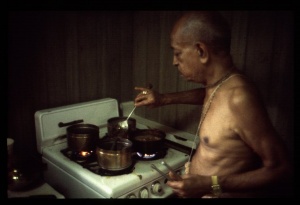SB 7.11.16: Difference between revisions
m (1 revision(s)) |
Tejaashvini (talk | contribs) No edit summary |
||
| Line 1: | Line 1: | ||
{{info | {{info | ||
|speaker= | |speaker=Nārada Muni | ||
|listener=King | |listener=King Yudhiṣṭhira | ||
}} | }} | ||
[[Category:Srimad-Bhagavatam - Canto 07 Chapter 11]] | |||
[[Category:Bhagavatam Verses Spoken by Narada Muni - Vanisource|071116]] | |||
<div style="float:left">'''[[Srimad-Bhagavatam]] - [[SB 7|Seventh Canto]] - [[SB 7.11: The Perfect Society: Four Social Classes|Chapter 11: The Perfect Society: Four Social Classes]]'''</div> | |||
<div style="float:right">[[File:Go-previous.png|link=SB 7.11.15]] '''[[SB 7.11.15]] - [[SB 7.11.17]]''' [[File:Go-next.png|link=SB 7.11.17]]</div> | |||
{{RandomImage}} | |||
==== TEXT 16 ==== | ==== TEXT 16 ==== | ||
<div | <div class="verse"> | ||
vārtā vicitrā śālīna- | :vārtā vicitrā śālīna- | ||
yāyāvara-śiloñchanam | :yāyāvara-śiloñchanam | ||
vipra-vṛttiś caturdheyaṁ | :vipra-vṛttiś caturdheyaṁ | ||
śreyasī cottarottarā | :śreyasī cottarottarā | ||
</div> | </div> | ||
| Line 17: | Line 22: | ||
==== SYNONYMS ==== | ==== SYNONYMS ==== | ||
<div | <div class="synonyms"> | ||
''vārtā''—the occupational means of livelihood for the vaiśya (agriculture, cow protection, and trade); ''vicitrā''—various types; ''śālīna''—livelihood achieved without effort; ''yāyāvara''—going to the field to beg for some paddy; ''śila''—picking up the grains left in the field by the proprietor; ''uñchanam''—picking up the grains that have fallen from bags in shops; ''vipra-vṛttiḥ''—the means of livelihood for the brāhmaṇas; ''caturdhā''—four different kinds; ''iyam''—this; ''śreyasī''—better; ''ca''—also; ''uttara-uttarā''—the latter compared to the former. | |||
</div> | </div> | ||
| Line 24: | Line 29: | ||
==== TRANSLATION ==== | ==== TRANSLATION ==== | ||
<div | <div class="translation"> | ||
As an alternative, a brāhmaṇa may also take to the vaiśya's occupational duty of agriculture, cow protection, or trade. He may depend on that which he has received without begging, he may beg in the paddy field every day, he may collect paddy left in a field by its proprietor, or he may collect food grains left here and there in the shops of grain dealers. These are four means of livelihood that may also be adopted by brāhmaṇas. Among these four, each of them in succession is better than the one preceding it. | As an alternative, a brāhmaṇa may also take to the vaiśya's occupational duty of agriculture, cow protection, or trade. He may depend on that which he has received without begging, he may beg in the paddy field every day, he may collect paddy left in a field by its proprietor, or he may collect food grains left here and there in the shops of grain dealers. These are four means of livelihood that may also be adopted by brāhmaṇas. Among these four, each of them in succession is better than the one preceding it. | ||
</div> | </div> | ||
| Line 31: | Line 36: | ||
==== PURPORT ==== | ==== PURPORT ==== | ||
<div | <div class="purport"> | ||
A brāhmaṇa is sometimes offered land and cows in charity, and thus for his livelihood he may act in the same way as a vaiśya, by cultivating land, giving protection to cows and trading off his surpluses. A better process, however, is to pick up grains from a field or from a dealer's shop without begging. | A ''brāhmaṇa'' is sometimes offered land and cows in charity, and thus for his livelihood he may act in the same way as a ''vaiśya'', by cultivating land, giving protection to cows and trading off his surpluses. A better process, however, is to pick up grains from a field or from a dealer's shop without begging. | ||
</div> | </div> | ||
__NOTOC__ | |||
<div style="float:right; clear:both;">[[File:Go-previous.png|link=SB 7.11.15]] '''[[SB 7.11.15]] - [[SB 7.11.17]]''' [[File:Go-next.png|link=SB 7.11.17]]</div> | |||
__NOTOC__ | |||
__NOEDITSECTION__ | |||
Revision as of 15:15, 31 May 2021

A.C. Bhaktivedanta Swami Prabhupada
TEXT 16
- vārtā vicitrā śālīna-
- yāyāvara-śiloñchanam
- vipra-vṛttiś caturdheyaṁ
- śreyasī cottarottarā
SYNONYMS
vārtā—the occupational means of livelihood for the vaiśya (agriculture, cow protection, and trade); vicitrā—various types; śālīna—livelihood achieved without effort; yāyāvara—going to the field to beg for some paddy; śila—picking up the grains left in the field by the proprietor; uñchanam—picking up the grains that have fallen from bags in shops; vipra-vṛttiḥ—the means of livelihood for the brāhmaṇas; caturdhā—four different kinds; iyam—this; śreyasī—better; ca—also; uttara-uttarā—the latter compared to the former.
TRANSLATION
As an alternative, a brāhmaṇa may also take to the vaiśya's occupational duty of agriculture, cow protection, or trade. He may depend on that which he has received without begging, he may beg in the paddy field every day, he may collect paddy left in a field by its proprietor, or he may collect food grains left here and there in the shops of grain dealers. These are four means of livelihood that may also be adopted by brāhmaṇas. Among these four, each of them in succession is better than the one preceding it.
PURPORT
A brāhmaṇa is sometimes offered land and cows in charity, and thus for his livelihood he may act in the same way as a vaiśya, by cultivating land, giving protection to cows and trading off his surpluses. A better process, however, is to pick up grains from a field or from a dealer's shop without begging.